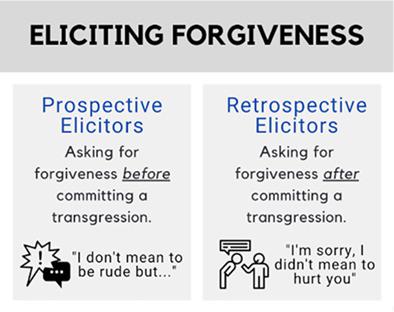当前位置:
X-MOL 学术
›
WIREs Cogn. Sci.
›
论文详情
Our official English website, www.x-mol.net, welcomes your
feedback! (Note: you will need to create a separate account there.)
Eliciting forgiveness
WIREs Cognitive Science ( IF 3.2 ) Pub Date : 2021-07-26 , DOI: 10.1002/wcs.1572 Meltem Yucel 1 , Amrisha Vaish 1
WIREs Cognitive Science ( IF 3.2 ) Pub Date : 2021-07-26 , DOI: 10.1002/wcs.1572 Meltem Yucel 1 , Amrisha Vaish 1
Affiliation

|
When we commit transgressions, we need to be forgiven to restore our friendships and social standing. Two main ways we can elicit forgiveness is through asking for forgiveness after committing a transgression (i.e., retrospective elicitors) or before committing a transgression (i.e., prospective elicitors). Research on retrospective elicitors with adults and children indicates that apologizing or showing remorse elicits forgiveness from both victims and bystanders, and sheds light on the nuances of such elicitors and their functions. Far less is known about how adults and children respond to prospective elicitors of forgiveness, such as disclaimers (statements that prepare the listener for a transgression or a failure of character or performance, e.g., “I don't mean to be rude but…”), and how the functions and effectiveness of prospective elicitors compare to those of retrospective elicitors. Furthermore, much less is known about the additive effects of using both retrospective and prospective elicitors of forgiveness. A better understanding of how and when forgiveness is elicited in childhood and through adulthood promises to shed light on human sociality and cooperativeness.
中文翻译:

引起宽恕
当我们犯了罪时,我们需要得到宽恕,以恢复我们的友谊和社会地位。我们可以引出宽恕的两种主要方式是在犯法之后(即追溯引出者)或在犯法之前(即预期引出者)请求宽恕。对成人和儿童的回顾性诱导者的研究表明,道歉或表现出悔恨会引起受害者和旁观者的宽恕,并阐明这些诱导者的细微差别及其功能。关于成人和儿童如何回应宽恕的潜在诱因,例如免责声明(使听者为过犯或性格或表现的失败做好准备的陈述,例如,“我不是想粗鲁,但……”),我们知之甚少。 ), 以及预期引出者的功能和有效性与追溯引出者的功能和有效性相比如何。此外,关于使用回顾性和前瞻性的宽恕诱导者的附加效应知之甚少。更好地了解如何以及何时在童年和成年期引起宽恕,有望阐明人类的社会性和合作性。
更新日期:2021-07-26
中文翻译:

引起宽恕
当我们犯了罪时,我们需要得到宽恕,以恢复我们的友谊和社会地位。我们可以引出宽恕的两种主要方式是在犯法之后(即追溯引出者)或在犯法之前(即预期引出者)请求宽恕。对成人和儿童的回顾性诱导者的研究表明,道歉或表现出悔恨会引起受害者和旁观者的宽恕,并阐明这些诱导者的细微差别及其功能。关于成人和儿童如何回应宽恕的潜在诱因,例如免责声明(使听者为过犯或性格或表现的失败做好准备的陈述,例如,“我不是想粗鲁,但……”),我们知之甚少。 ), 以及预期引出者的功能和有效性与追溯引出者的功能和有效性相比如何。此外,关于使用回顾性和前瞻性的宽恕诱导者的附加效应知之甚少。更好地了解如何以及何时在童年和成年期引起宽恕,有望阐明人类的社会性和合作性。











































 京公网安备 11010802027423号
京公网安备 11010802027423号